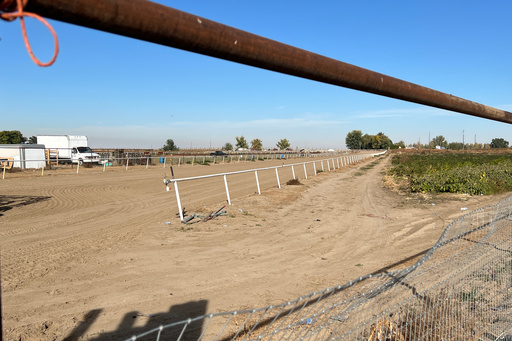BOISE, Idaho
By REBECCA BOONEAssociated Press
A federal judge has ordered the release of 16 people detained by immigration officials during an FBI-led raid at a rural Idaho racetrack last month. U.S. District Judge B. Lynn Winmill ruled Wednesday that keeping the migrants jailed without bond violated their due process rights, and he ordered that they be released while they wait for their immigration cases to be resolved. Winmill noted that many of them have lived in the U.S. for decades and lack any criminal history. A U.S. Department of Homeland Security statement said the detainees were lawfully arrested during the raid, and criticized the ruling as allowing lawbreakers to roam free.
BOISE, Idaho (AP) — A federal judge has ordered the release of 16 people detained by immigration officials during an FBI-led raid at a rural Idaho racetrack last month.
U.S. District Judge B. Lynn Winmill ruled Wednesday that keeping the migrants jailed without bond violated their due process rights, and he ordered that they be released while they wait for their immigration cases to be resolved. Many of them have lived in the U.S. for decades and lacked any criminal history, Winmill noted. Some are married to U.S. citizens or have children who are U.S. citizens, according to court documents.
In an e-mailed statement to The Associated Press, the Department of Homeland Security said Immigration and Customs Enforcement agents lawfully arrested the detainees during the raid, and added that “an activist judge is ordering lawbreakers to roam free.”
"The Trump administration is committed to restoring the rule of law and common sense to our immigration system, and will continue to fight for the arrest, detention, and removal of aliens who have no right to be in this country,” the department said.
The Oct. 19 raid at the privately operated outdoor track in Wilder was led by the FBI as part of an investigation into suspected illegal gambling. More than 200 officers from at least 14 agencies, including U.S. Immigrations and Customs Enforcement and Border Patrol, participated in the raid, detaining around 400 people for hours, including many U.S. citizens.
Witnesses described aggressive tactics, including zip-tying children or separating young kids from their parents for an hour or more. Homeland Security Secretary Kristi Noem, whose agency oversees Border Patrol and ICE, denied that children were zip-tied. FBI spokesperson Sandra Barker initially said no restraints or rubber bullets were used on children but later amended that statement, replacing “children” with “young children.”
The raid resulted in only a handful of gambling-related arrests, while 105 people were arrested on suspicion of immigration violations. Many of them signed voluntary agreements to leave the country before they were able to talk to immigration lawyers, said Nikki Ramirez-Smith, an immigration attorney whose firm is representing 15 of the people released this week.
Just 18 people detained in the raid have sought their release in the federal courts in Idaho, according to online court records. One of them had that request initially dismissed after a judge found that they did not include enough detail in their court filing, but the judge also gave them 30 days to try again. Another person is now pursuing release through a different federal court after they were transferred to a detention facility in a different state.
The federal judge in Idaho said that nearly all of his colleagues who have faced similar requests from immigration detainees have come to the same conclusion: That non-citizens who are detained while already present in the United States are entitled to due process rights.
“Treating the detention of noncitizens stopped at or near the border differently from noncitizens who reside within the country is not an anomaly. Instead, it reflects the long-recognized distinction in our immigration laws and the Constitution that due process protections apply to noncitizens residing within the country but not those stopped at or near the border,” Winmill wrote.
Ramirez-Smith said Winmill's release orders do “a great job of putting into perspective what the issues are."
“They’ll just stay home with their families, and we’ll file the applications for relief in immigration court, and they’ll get a court hearing. Those trial dates will probably be years out,” she said, because of a hefty backlog of more than 3 million cases in immigration courts.
Still, President Donald Trump has taken steps to reduce the backlog, instructing judges during his first term to deny entire categories of asylum claims such as for victims of gang or domestic violence.
During his current term, the Trump administration has fired dozens of immigration judges, and authorized about 600 military lawyers to work as temporary immigration judges. The administration has also frequently turned what would normally be routine immigration hearings into deportation traps, with government lawyers quickly dismissing asylum cases so the migrants who sought asylum can be immediately arrested in the courthouse halls.





